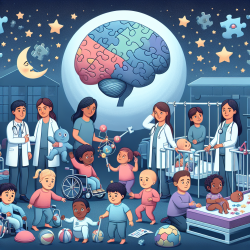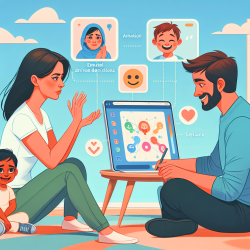Introduction
In the ever-evolving field of speech-language pathology, practitioners constantly seek innovative approaches to enhance therapeutic outcomes for children. A recent study titled "Beliefs and Experiences of Individuals Following a Zero-Carb Diet" offers intriguing insights that, while primarily nutritional, provide valuable lessons for our field. This blog explores how the findings from this research can be leveraged to improve speech-language pathology practices, particularly in the context of online therapy services like those provided by TinyEYE.
Understanding the Research
The study explored the beliefs and experiences of individuals adhering to a zero-carb diet, revealing that health concerns and benefits were primary motivators. Participants reported improved well-being, a strong sense of community, and intentions to maintain the diet indefinitely. However, challenges such as social stigma and lack of support from healthcare providers were also noted.
For speech-language pathologists, the parallels between dietary adherence and therapeutic commitment are noteworthy. The study's emphasis on community support, personalized approaches, and the need for professional guidance aligns with key principles in effective therapy delivery.
Applying Research Insights to Speech-Language Pathology
- Community and Support: Just as zero-carb dieters found strength in online communities, children and families can benefit from supportive networks. Encouraging peer interactions and family involvement in therapy can foster a sense of belonging and motivation.
- Personalization: The study highlights the importance of tailoring approaches to individual needs. In speech-language pathology, personalized therapy plans that consider a child's unique challenges and strengths can lead to more effective outcomes.
- Professional Guidance: The lack of support from healthcare providers in the study underscores the necessity for informed and empathetic guidance. Speech-language pathologists should strive to be knowledgeable advocates for their clients, offering evidence-based strategies and support.
Encouraging Further Research
The study calls for more research into the benefits and limitations of zero-carb diets. Similarly, in speech-language pathology, ongoing research is crucial to validate and refine therapeutic approaches. Practitioners are encouraged to engage with current research, contribute to studies, and apply findings to enhance practice.
Conclusion
The insights from the zero-carb diet study offer valuable parallels for speech-language pathology. By fostering community support, personalizing therapy, and providing professional guidance, practitioners can enhance outcomes for children. Embracing a research-driven approach ensures that therapy remains effective and responsive to the needs of each child.
To read the original research paper, please follow this link: Beliefs and Experiences of Individuals Following a Zero-Carb Diet.










